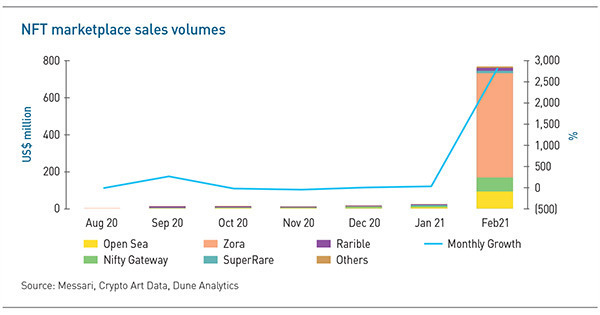
NFTs: Spirits in an invisible world

The use of blockchain to create digital assets has evolved from the mass circulation of ethereal, volatile, and interchangeable tokens into something that feels much more real
Gauging the ultimate potential of non-fungible tokens (NFTs) is not a matter of assessing their ability to improve market efficiencies, reduce fraud, remove transaction intermediaries, and create entirely new, frictionless economies. It's about human nature.
These blockchain-based assets distinguish themselves from cryptocurrencies through code that defines them as unique and irreproducible. As such, they are introducing the concept of true ownership to a virtual world that is increasingly concrete in the hearts and minds of the world's younger generations. One bitcoin is the same as any other, but an NFT is an utterly distinct – and personal – property.
A migration from the physical world to cyberspace has been progressing for decades, mostly in the form of people's identities, careers, hobbies, and relationships. With NFTs, the migration is beginning to include genuine assets with quantifiable, exchangeable value. For many, this is not just a technological novelty – it's a matter of freedom, inclusion, and status.
The so-called metaverse, where everything from real estate to shoes exists in the form of NFTs, is the landscape hosting this phenomenon. Most NFTs in this space will not be particularly valuable; the important point is that they will be owned by individuals rather than the technology companies that create them. The purchasing of digital items within gaming metaverses is a well-established practice, but game developers have traditionally controlled it all, much to the bemusement of players.
Yat Siu, co-founder of Hong Kong NFT and gaming start-up Animoca Brands, observes that life lived on the internet is no longer just an adjunct to an unplugged existence, a transition that has become increasingly undeniable in the wake of COVID-19. Animoca reflected investor confidence in this idea last month, when it raised $144 million at a valuation of $1 billion as the NFT side of the business began to overshadow its more traditional gaming interests.
"I don't think this is a movement that' s going to stop at hundreds of millions of users. To me, this is where the entire world wants to go," says Siu, who also helped pioneer Hong Kong's internet start-up scene in the early 2000s. He sees evidence of similar user uptake trends playing out with NFTs but with an added emotional driver rooted in the role of possessions in the ego.
"When you buy a Rolex, you're not just buying the craftsmanship. What you're buying is the community, including celebrities in the ads saying, ‘I have a Rolex, so you're like me.' What you're really buying into is the authenticity and provenance of the entire network and history that is Rolex. I don't know if you'd call it a social network, but it's social proof that you have now received the status of owning a Rolex."
Gamer's panacea?
The highest-profile applications of NFTs in the mainstream media have revolved around art and the technology's ability to facilitate the sale of one-of-a-kind creations or a limited series of unforgeable, signatured works. Earlier this month, HashKey, a blockchain specialist that backed Animoca, helped realize a sale by Hong Kong auctioneer Macey & Sons, whereby a painting by art collective Tamen was converted into an NFT and paid for with bitcoin.
Nevertheless, things are bubbling much more quicky in the gaming sector's relatively obscure virtual domains. Companies such as Animoca that have begun to sell NFTs in gaming metaverses note that the value of the purchased assets increases in step with the population of players. Meanwhile, currency for acquiring these assets can be accrued in the context of the game, establishing a mini-economy that is organized but not fully controlled by the game developer.
Even if a game shuts down, players continue to own the NFTs they bought in that metaverse and will be incentivized to reapply them in another virtual setting. This could involve rebuilding the original game or launching something new. Those who own the most will have the greatest interest in the survival of the economy, and evidence of demand for this paradigm is mounting.
In developing countries, earning game-specific cryptocurrencies has become the dominant form of income for some individuals. The assets they accumulate can be exchanged for hard cash to pay bills in the real world or reinvested in game-related NFTs. Vietnam's Axie Infinity, a Pokemon-style creature battling game, has become one of the global leaders in this trend, having crossed $1 billion in NFT sales earlier this month.
Axie Infinity demonstrates NFT demand not only in the size of its economy but also in the hassle of getting involved. Just to get started, players need to have the cryptocurrency Ethereum and a MetaMask wallet, pay $300 for the game itself, and download TestFlight, which is only available in Apple's fee-based iOS developer program. Still, Axie Infinity has seen its revenue go from $100,000 in January to $197 million in July.
"As a gamer myself, I have understood but been frustrated by game developers' control over in-game assets," says Eddie Thai, general partner at 500 Startups Vietnam, which first invested Axie Infinity in 2019 and reupped as part of a $7.5 million Series A round in May.
"Purchases of in-game assets are a major revenue stream for developers, so of course they want to have that centralized rather than allowing players to buy and sell from each other. In fact, many developers will ban players who attempt inter-player sales. Imagine a government saying that entrepreneurs can build companies but cannot sell them. Entrepreneurship would die."

Smart investment in this space is not necessarily about jumping on the early-movers before they get too pricey. Cryptokitties, a similar NFT-based game from Canadian studio Dapper Labs, launched as early as 2017 and attracted investment from the likes of Andreessen Horowitz. But it is now generally regarded as rudimentary with little interactive gameplay. Thai notes that in addition to being selective, VCs can mitigate risk through support.
"Whether they know it or not, NFT companies can benefit from support just like any other kind of start-up," he says. "With Axie Infinity, we brought them into our Silicon Valley-inspired, Saigon-based accelerator program to help them articulate their vision, understand how to build a growth engine, define a team culture, and more. Even now as they reach new heights, we are always available."
A wider universe
Less developed but potentially broader applications of NFTs are also starting to come to light. The technology is expected to allow individual creators, influencers, and online media personalities to create their own game-like economies. E-sports and fashion are considered likely hotspots.
Businesses in this vein would involve a digital coin, which has a nominal value in itself but more importantly gives its holders benefits related to the entrepreneur's activities. The influencer models that have sprung up across Asia in recent years are commonly predicted to begin adopting this concept en masse within a year.
Victor Zhang, founder of Australia's AlchemyNFT, has delivered more than 30 NFT related projects globally in the past four years. His breakthrough was a collaboration with the FIFA World Cup in 2018, which involved the tokenization of 50 VIP passes to the soccer event in Russia. The tickets were individually distinct NFTs that could be pulled up on a phone with a QR code allowing entry at the gate.
Other projects followed such as a digital billboard advertising scheme, whereby NFTs representing three hours of display time were sold. Owners of the NFT were able to access a portal that controlled the billboard at specific timeslots. Another model involved vouchers that allowed, for example, a cafe to issue NFTs that could be redeemed for a coffee. As representations of confirmed sales and foot traffic, they could even be used as collateral in separate financing exercises.
Ticketing is set to be a major use-case because NFTs eliminate counterfeiting and can be designed such that their creator retains exposure after subsequent sales. This means that event organizers will get a piece of the scalpers' market, which is often larger than the primary online and box office markets. AlchemyNFT followed up on this theme by partnering with Booking.com to issue NFT tickets for European Football Championship 2020, but the project was abandoned due to COVID-19.
Zhang expects the art, creator economy, and hobbyist categories to continue dominating the NFT opportunity in the foreseeable future. With this in mind, AlchemyNFT raised $6 million last month from a group of investors including HashKey. The plan is to build out a "remixing" platform that allows the company to add embellishments and new usage rights to autographed NFT artworks and collectibles.
"Previously, we would tell people about our experiments, and they were not that interested. This year, we see NFTs becoming a very hot topic, and when we tell people we did this ticket project in 2008, they're very surprised," Zhang says. "They see so many collectibles, now they want to see more utilities. Actually, rendering a picture is a kind of utility, but most of the public doesn't treat it that way."
Getting creative
Whether any given NFT is seen as a collectible or a utility, each one will be subject to multiple layers of usage and financial exposure rights. This is already well understood in creative industries, where copyright owners are seeking out technical support to monetize the NFT wave and start-ups are pitching their services to intellectual property (IP) holders from Coca-Cola to pop singer Ariana Grande, who staged a virtual concert this month inside the game Fortnite.
Singapore's Culture Group, a brand marketing services provider that operates at the nexus of entertainment and IT, is tracking this movement closely and it is bullish about the role of NFTs going forward. The company is working with several organizations with a view to helping Asia-based IP owners and creators establish blockchain-enabled fan clubs. The idea is to start new revenue streams through the sale of NFT collectibles and tickets while amassing data on the audience.
"Industries such as credit cards, airlines, and certain aspects of retail, have highly developed customer relationship management. They're tracking the growth and behavior of customers over the long term and increasing their relationship with them as a result. We don't see that in traditional entertainment, creative, or media-driven businesses," says Michael Patent, founder of Culture Group.
"So, we see NFTs in a very functional way – not as collectible art but as technology for creating a disintermediated customer relationship. It authenticates fans and allows organizations and creators to market to those fans in a much more intelligent way. That's the first area of opportunity."
Online businesses, including IP-driven media outlets, have long watched their customers and crunched the behavior data to improve marketing to an unwitting audience. What makes this concept different in the NFT era is not only the efficiency, security, and transparency benefits that come with blockchain – it's the willing participation of the public.
In this way, demand for deeper engagement is the secret sauce of the NFT theme, and it will come with a stark generational divide. With the exception of technocrats already trading in digital assets, the line between the devoted and the oblivious is currently said to be around 25 years old. According to HashKey, generation Z is the first demographic to make no distinction between virtual and physical experiences – and they only represent the beginning.
"I'm the oldest in my investment team. For the team members who were born after the 1990s, I think they spend half of their time online in a virtual world, and they allocate at least half of their assets onto the blockchain or virtual world," says Deng Chao, a managing director and leader of the investment team at HashKey. "If we want to be successful investors, we have to realize that trend and seize opportunity in it."
Latest News
Asian GPs slow implementation of ESG policies - survey
Asia-based private equity firms are assigning more dedicated resources to environment, social, and governance (ESG) programmes, but policy changes have slowed in the past 12 months, in part due to concerns raised internally and by LPs, according to a...
Singapore fintech start-up LXA gets $10m seed round
New Enterprise Associates (NEA) has led a USD 10m seed round for Singapore’s LXA, a financial technology start-up launched by a former Asia senior executive at The Blackstone Group.
India's InCred announces $60m round, claims unicorn status
Indian non-bank lender InCred Financial Services said it has received INR 5bn (USD 60m) at a valuation of at least USD 1bn from unnamed investors including “a global private equity fund.”
Insight leads $50m round for Australia's Roller
Insight Partners has led a USD 50m round for Australia’s Roller, a venue management software provider specializing in family fun parks.







